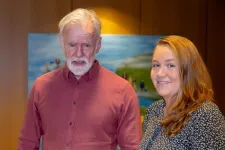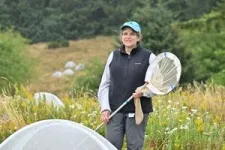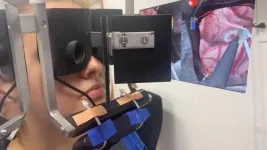(Press-News.org) Three common variants increase the risk of Wolff-Parkinson-White syndrome
Study by scientists at deCODE genetics/Amgen and collaborators in Denmark and the USA, on the genetics of accessory conduction pathways in the heart (Wolff-Parkinson-White syndrome), reveals that accessory pathways can cause rhythm disturbances, characterized by an overly fast heartbeat, which can be life-threatening.
Accessory pathways are found among around 0.3% of individuals, but their prevalence is likely higher as a majority of them do not cause symptoms that lead to diagnosis. It is believed that other individual factors can influence the likelihood of developing rhythm disturbances in the presence of accessory pathways.
The results of the genetic study showed that three sequence variants, two in the gene CCDC141 and one in the gene SCN10A, affect the accessory pathways and consequent rhythm disturbances. The variants are common, with frequencies ranging from 3-62%. The variants also associate with increased conduction velocity in the atria, and heart rate regulation, supporting the notion that these factors influence the risk of rhythm disturbances among those with accessory pathways.
While medical therapy can reduce the risk of rhythm disturbances, the only definitive treatment for accessory pathways is to ablate the pathway. This procedure is not without risks, and therefore risk assessment is a key factor in treatment choice. Knowledge about the genetics of accessory pathways and their consequences is limited, but such information could prove useful for risk assessment.
END
Three common variants increase the risk of Wolff-Parkinson-White syndrome
2024-09-04
ELSE PRESS RELEASES FROM THIS DATE:
AERA selects Elise Boddie to deliver 2024 Brown Lecture in Education Research
2024-09-04
Washington, D.C., September 4, 2024—Elise Boddie, James V. Campbell Professor of Law at the University of Michigan Law School, has been selected by AERA to present the 2024 Brown Lecture in Education Research. Her lecture, titled “Brown v. Board of Education and the Democratic Ideals,” will take place on Thursday, October 24, 6:30 p.m. ET, at Howard University in Washington, D.C., and will be livestreamed. Registration for in-person attendance and for the livestream will open in early September. The event is free and ...
Brown to lead $2.8 million NSF grant to create an undergrad research administration curriculum
2024-09-04
BIRMINGHAM, Ala. – Chris Brown, Ph.D., is a former researcher who now heads research administration at a university with more than $780 million in research expenditures. Yet Brown — like other research administrators across the nation — had to learn his profession on the job because there is no complete, formal, recognized career training for the thousands of people who have a version of “research administrator” in their titles.
To fill this critical gap, Brown, vice president for Research at the University of Alabama at Birmingham, will lead a three-year, ...
Traditional infrastructure design often makes extreme flooding events worse
2024-09-04
Images
Much of the nation's stormwater infrastructure, designed decades to a century ago to prevent floods, can exacerbate flooding during the severe weather events that are increasing around the globe, new research led by the University of Michigan demonstrates.
The problem lies in traditional planning's failure to recognize flood connectivity: how surface runoff from driveways, lawns and streets—and the flows in river channels and pipes—are all interlinked. The result ...
A new role for intelligent tutors powered by AI in brain surgery?
2024-09-04
Neurosurgery is perhaps one of the most demanding professions in healthcare. Surgeons spend long hours performing operations where expert performance means the difference between a good and bad patient outcome. While operative injuries are rare, when they occur, they can have serious, and lifelong consequences.
Researchers at the Neurosurgical Simulation and Artificial Intelligence Learning Centre at The Neuro (Montreal Neurological Institute-Hospital) of McGill University are striving to improve brain surgery training by designing real-time, intelligent tutors powered by AI. These systems are designed ...
MD Anderson research highlights for September 4, 2024
2024-09-04
HOUSTON ― The University of Texas MD Anderson Cancer Center’s Research Highlights showcases the latest breakthroughs in cancer care, research and prevention. These advances are made possible through seamless collaboration between MD Anderson’s world-leading clinicians and scientists, bringing discoveries from the lab to the clinic and back.
Protein expression atlas covers almost all cancer hallmarks
The Cancer Genome Atlas (TCGA) and Cancer Cell Line Encyclopedia (CCLE) provide DNA and RNA data from approximately 11,000 patient samples across 33 cancer types and 1,000 cancer cell lines, but limited protein information is available. Researchers led by Han Liang, Ph.D., Rehan Akbani, ...
At-risk butterflies more likely to survive with human help
2024-09-04
VANCOUVER, Wash. – Some of the butterflies most in danger of fluttering out of existence fare better when their habitats are actively managed by humans, a recent study found.
A team led by Washington State University researchers Cheryl Schultz and Collin Edwards analyzed data on 114 populations of 31 butterfly species in 10 U.S. states. Scientists have long warned that insect populations worldwide are falling rapidly due to the combined effects of climate change, habitat loss and pesticides. Overall, the research team found that these at-risk butterflies ...
National Cleveland Clinic survey examines generational divide in men's health
2024-09-04
Embargoed until 12:01 a.m. Wednesday, September 4, 2024, CLEVELAND: A new national survey by Cleveland Clinic revealed similarities and differences across generations when it comes to men’s health. The survey highlights health priorities and concerns among men; however, there were generational differences in health habits, mental health and the use of social media as a source of health information.
While 95% of men surveyed said living a healthy lifestyle is their top priority, findings show that different health behaviors exist among ...
Sex and size disparities in access to liver transplant for patients with hepatocellular carcinoma
2024-09-04
About The Study: In this study, women with hepatocellular carcinoma were less likely to receive a deceased-donor liver transplant and more likely to die while wait-listed than men with hepatocellular carcinoma; these differences were largely (but not entirely) explained by sex-based differences in candidate size. For candidates listed with exception scores, additional changes to allocation policy are needed to resolve the sex disparity, including solutions to improve access to size-matched donor livers for smaller candidates.
Corresponding Author: To ...
The world's first nuclear clock
2024-09-04
For many years, scientists all around the world have been working towards this goal, now suddenly things are happening very fast: it was only in April that a team led by Prof Thorsten Schumm (TU Wien, Vienna) announced a major success. For the first time, an atomic nucleus had been switched from one state to another using a laser – an effect that can be used for high-precision measurements. Now, just a few weeks later, this thorium transition was successfully applied in practice: TU Wien and JILA/NIST (USA) succeeded in combining a high-precision optical atomic clock with ...
H5 influenza vaccines: what needs to be done to reduce the risk of a pandemic
2024-09-04
WASHINGTON — As the global threat of H5N1 influenza looms with outbreaks across species and continents including the U.S., three international vaccine and public health experts say it is time to fully resource and support a robust strategy to address this and future potential pandemic influenza threats, including to consider voluntary vaccination for those now at exposure risk.
“At this critical juncture, decisions about vaccine development, stockpiling, and deployment will shape our ability to respond to immediate and future pandemic risks,” write Jesse Goodman, MD, PhD; Rick A. Bright, PhD; and Nicole Lurie, MD, ...






